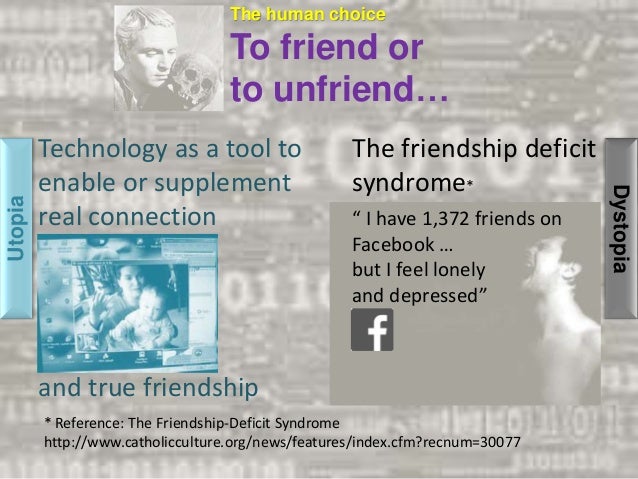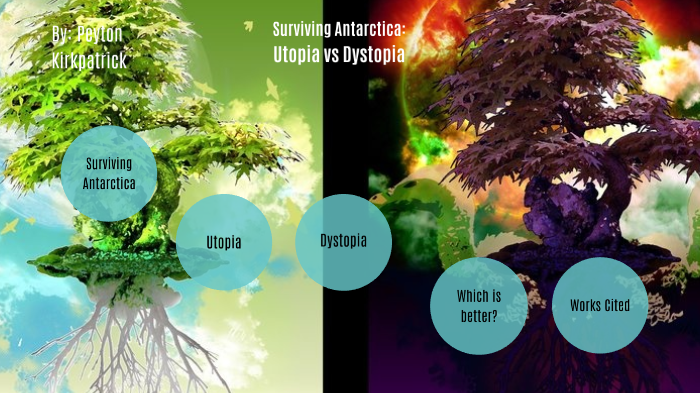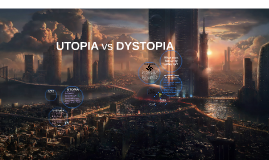

One of the great things about our world is we don't know whether what we create will be a dystopia or a utopia. Did you know dystopia comes from the word utopia The word dystopia comes from adding the Latin prefix dys which means bad. If the intelligent life overrun the current government etc, would it have enough technology to keep the world from becoming a dystopia? Of course, whether this qualifies as a utopia depends entirely on you, as there is no defined "best world" that everyone agrees upon. As long as the utopia retains enough capabilities to reach out into the dystopia to find that cure when it appears, your utopia retains its status. One particularly tenuous Utopia is one which is dependent on the possibility that something in the dystopia will eventually cure the demise of the utopia. For example, if your definition of utopia only includes the relative power of things, your utopia can shed energy and other resources into the outer dystopia while remaining utopian, so long as it sheds those things in a way which retains the balances your utopian definition calls for. On the other hand, it's also possible to make utopias that can exist forever, depending on your own individual definition of a utopia. This answer is dependent on countless details, so the answer would have to be "maybe." It's trivial to show an apparent utopia that crashes into a dystopia. Would the Utopian world slowly diminish and eventually become fully Dystopian or do you think the life could keep up the small Utopia within? Utopia means an ideal state, a paradise, a land of enchantment. This is actually quite a common trope with VR Dystopia Each person has their own vision of utopia.

One extreme example is with neural interconnects or drugs which let someone live in a Utopian world while the actual world crumbles beneath them. There's countless ways to make this work. Dystopia in form and function.Is it possible to turn the world from a Utopia to a Dystopia while still keeping a "Headquarters" that is utopian?Ībsolutely.

To coincide with the festival, A/D/O partnered with designers MOS Architects, Assemble, Inaba Williams / MTWTF and more to create site-specific, large-scale installations and exhibitions that explore the theme of Utopia vs. Where everyone lives fairly, feels happy, free, give love for each other. Marcus Fairs, Founder and Editor-in-Chief of Dezeen, moderated a panel that investigated design in a post-truth era. a futuristic, imagined universe in which oppressive societal control and the illusion of a perfect society are maintained through corporate, bureaucratic. Other highlights included a discussion on the ethics of artificial intelligence in the dawn of the Internet of Things from Kate Darling, Research Specialist at the MIT Media Lab and Fellow at the Harvard Berkman Center, and a discussion on handcraft techniques in the age of automation from A/D/O’s first Designer in Residence Stephen Burks. The closing keynote was presented by David Byrne, founder of Talking Heads, who outlined his version of utopia and dystopia through ideas in urban development.

Alice Rawsthorn explored what design means in today’s turbulent times Yves Béhar discussed new principals in design within today’s technological context and John Maeda discussed the potential for the success of technology when focusing on inclusivity. The festival featured conversations with some of the world’s foremost voices in the field of design. Dystopia: Designing Our Imagined Futures.” The festival cast a critical eye on major cultural disruptions and scientific advances such as robotics, artificial intelligence, automation and new production technologies, and the role designers will play in tipping the scales toward utopia or dystopia. 2.Dystopia is the opposite of utopia because everything seems to be imbalanced, chaotic, lawless, unruly, dirty, violent, and the like. Everything seems to be good and smooth flowing with the right balance of the social, governmental, and religious systems among others. any visionary system of political or social perfection. Summary: 1.Utopia is what most would regard as a paradise. To kick off the first season of the Design Academy, A/D/O hosted a three-day festival of talks, films, panels, and experiential programming that explored the theme of “Utopia vs. an imaginary island described in Sir Thomas More's Utopia (1516) as enjoying perfection in law, politics, etc. Just as startling is the state of ignorance in which Jonas and the other community members. Some are amazed while others are unsatisfied by the lack of choices the members of the community are afforded. January 2017 - The creative space, A/D/O, host a three day design festival. Many people find themselves frustrated at the ending of The Giver because they want to know what happens to Jonas and the baby.


 0 kommentar(er)
0 kommentar(er)
